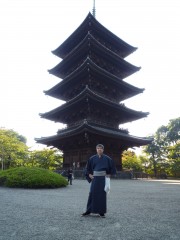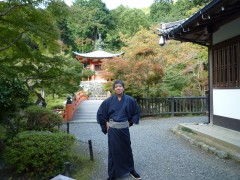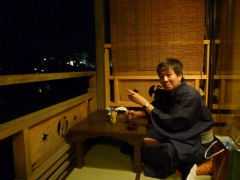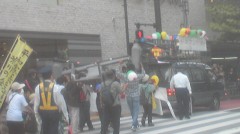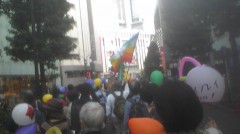25 October 2012
Visited Miyako wearing Kimono
Last weekend I went to Kyoto city which was called Miyako in famous Hollywood Geisha film "Memoirs of a Geisha."
I visited there a few times in the past. But this time was kind of new experience because I wore kimono all the time during my trip.
Do you know what kimono literaly means in Japanese? It means "thing to wear." Yes, that simply means "cloth." In the old days everyone wore it in everyday life. Now people wear it occasionally only for special events such as New Year's day, coming of age or wedding ceremony. Most of us do not wear it casually. Even in Kyoto, you could rarely see people in kimono.
That should be considered very dissapointing, isn't it. That is why I decided to wear in Kyoto. Not just for special event. I did it all the time during the trip including the time I am staying at hotel and using transportation such as bus and subway. I impressed not only foreign tourists but Japanese there.
In Kyoto I visited the Geisha towns, Budhist temples and shrines. I could enjoy viewing those places in a very different way because of kimono. Kimono restrains you and makes you walk difficult. Not just kimono, I wore Japanese tradtional socks, called Tabi and sandals, called Zori. Those things disturbed me as well.
But that is why I had different experience from the past trips. I experienced how people viewed the places when the places was first established. I could share experience with people in the old eras.
Japanese lifestyle has dratiscally changed since Japan opened door to the West. We seemed lost our identity by that. Wearing kimono can revive our lost identity and traditional feeling.
See the photo of the below. That is traditional way of enjoying meals and sake. I did it on balcony of riverside restaurant. I enjoyed nice view as well as tasty sake and delicous Kyoto cuisine.
Kimono and Kyoto are what we should be proud of.
11 October 2012
Translated Novel: "Let's Fundoshi" Chapter 5
A Candadin man experiences FUNDOSHI, Japanese traditional male underwear, swimming suit and custume for festival.
Read Chapter 1 first.
“Hi, Taro” Jacques greeted him. He met him in a situation he never wanted to meet in. But surprisingly Taro wore Fundoshi swimwear as well. Red Fundoshi.
Jacques asked him “you came here for swimming” in English.
“Yes, in this traditional swimwear, Why are you wearing it?”
“I came to Japan so I thought of trying it” he pretended to be casual.
“Nowadays, even Japanese don’t wear it as swimwear. Most Japanese do not know how to wear it. Even I recently learned that” said Taro unhappily.
“Why did you want to wear it?”
“Not to lose identity as Japanese.”
Taro said glaring at Jacques and then ran towards the sea. His muscular strong body and ass in red Fundoshi tells what he wanted to tell. Jacques followed Taro.
“Are you jealousing me? You think I took away Yuriko from you.”
He reached where Taro was in the water. The two bathed to the shoulder.
“Westerners came to Japan and showed their superiority to plant inferiority to us. They made us think everything west is better and got down Japanese traditional culture.”
Taro said in Japanese.
“What has to do with Yuriko? Do you think she chose me because I am westerner.”
Jacques replied in Japanese.
Taro kept silent for a while and then spoke out.
“I am sorry. I never meant to blame you. But I just couldn’t accept this. I loved her for a very long time. I thought I could marry her. But it ended up like this. I am so ashamed. But you being foreigner makes me so hard. Kind of inferior complex. I lost to you because of culture. When I was in England, westerners don’t really know things other than the West and looked down upon us. I thought you are one of them, that makes me so hard.”
“I am not. I studied Japanese and Japanese culture. I like Japanese and Japan. Yuriko is Yuriko. She is wonderful. Not because she is Japanese. Can’t you understand? I was attracted to her and fell in love. She gladly responded to my love for her. That’s all.”
Jacques explained desperately. Suddenly Taro smiled to him.
“You are right. She just chose you. That is the fact I have to accept. I understand.”
Taro went back to the beach. Jacques looked at his back while bathing. Jacques felt comfortable. It is because of Fundoshi. In the water, it made him feel better than modern swimwear. He could feel water on his bare ass. This is nice swimwer!
When Taro got to the beach, he looked back to see Jacques and said,
“Fundoshi suits you, Jacques-san. You look handsome.”
Then Taro went away from the beach.
Jacques thought bathing in water. Do Japanese feel inferior complex to westerners? That is the reason why they don’t wear Fundoshi any more? Functionally western way should be better. But when it comes to succeeding tradition, one should have different thought.
Speaking of succession of tradition, Jacques had mutuality. That was Jacques being French Canadian. French descendants were minority among Canadians. In State of Quebec, many immigrated from France. But they were on unfavourable status compared to British descendants that accounts for majority. It had been that way since foundation of the country. Outside Quebec was English speaking only in North America.
Those who spoke French as mother tongue always had problems. Sometimes independence movement arose. Jacques’ parents sent him to English schools taking account into such status. He chose to attend college in Toronto to learn things in English. It was better for him but he could not help thinking that might have resulted in losing his national identity somehow.
That was strange mutuality with Japanese.
Jacques told Yuriko about what happened on the beach with Taro.
Yuriko seemed surprised and said, “Taro wore Fundoshi.”
“Oh, Funshoshi swimwear. I wore that as well in my childhood. All the kids had to wear that. In Fundoshi, if a child got drown, someone could easily catch his cloth. We also wore it in festival” said Taizo.
“Festival, Summer Festival every year?” Yuriko said that with surprise.
Continued to Chapter 6.
17:05 Posted in My novel | Permalink | Comments (0)
08 October 2012
Japan's protest against Osprey (MV-22) deployment
Joined demonstration march in Shibuya, most crowded shopping and entertaining district in Tokyo.
Estimated around 400 people participated. 12 ospreys were deployed in Okinawa, Southernmost island of Japan. Osprey is a hyprid helicoptor that cause strong noize and probability of accident is higher than conventional helicoptors. Propellers work as helicoptor on pad but when it goes high, the mode is changed to airplane that enables it fly further.
But this mode change action can cause severe accident including crashes onto the ground without control.
It is said that US military deployed Ospreys in Okinawa because they were not allowed to maneuver flying in their homeland because of safety problems, that aggrevated Okinawans and Japanese nationals. US-Japan treaty is one between independent sovereign nations.
As other issues such as Nuclear aircraft carrier (CVN 73) in Yokosuka, safety may not be prioritized issue. Highest prioritized issue is why we have to carry burden of US military which does not actually defend us. Threat from China? China is no longer enemy for the U.S. China has become even more important economic ally than Japan for the U.S. Even US influential congressman said military stationed in Okinawa is nothing but ruin of the Cold War.
Recently even after deployment of the new helicoptors, Chinese ships has invaded Japanese sea near Okinawa very frequently. If deterrence works, why do Chinese do that?
We really wonder why US military is stationed in our country.
We should stop treating America as friendly nation although it is not our enemy.
20:53 Posted in Japan News, Politics, Tokyo Life, US-Japan relationship, USA issues | Permalink | Comments (0) | Tags: military, okinawa, nuclear aircraft carrier, osprey
07 October 2012
Film"The Help" and "Precious" Elegant & Rich Whites and Vulgar & Poor Blacks
Two films are stories about Afro-Americans in the U.S. Both of them described hard situations that Black people had experienced in the past and maybe even now.
"The Help" was a story of Afro-American maids working for white families in Mississippi in 1960's when segregation was very common. Afro-American maids were not allowed to share bathroom with white family members. They had to always put up with white people's arrogance. A young white writer decided to write about their experience and publish that by interviewing them.
"Precious" was about a girl of the same name living in Harlem, New York, 1980's. She got two babies with her father. She was raped since she was a child. Her mother abused her because of pregnancy. Her mother and she lived on welfare. She had to stop attending middle school for pregnancy. So she had to attend special school for dropped outs.
Portrayals of Black people in the both films are kind of, from white perspective although Afro-American characters played important roles. They spoke grammatically incorrect English like "You is smart." They looked uneducated, vulgar and violent, wheras white or lighter skin characters looked elegant, educated and kind. That reflects on reality? Maybe or maybe not.
For white viewers such kind of films satisfy their supremacy and ease frustration caused by forcible integration.
Has America changed since Civil Rights Act?
Mr. Obama is the president of the U.S. He is half-white and not descendant of slaves. If he was a pure Afro-American of slave descendant, he would have never been elected. He wasn't popular in the Southern States even among Democrats. Because he was elected, since his inauguration, number of Racist activist group has drastically increased.
Most recent survey for income gap among racial groups found Black and white gap recorded biggest since 1984 when the survey was first conducted. It was due to recession but why the burden biased to Afro-Americans? Racism? Poverty and lack of education caused by racial discrimination.
I don't like this part of America but this is reality of America.
22:54 Posted in Film, Media, Society | Permalink | Comments (0) | Tags: racism, afro-american, history, poverty






